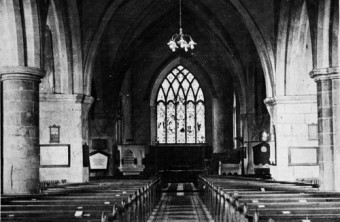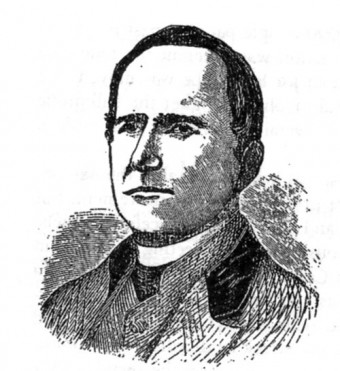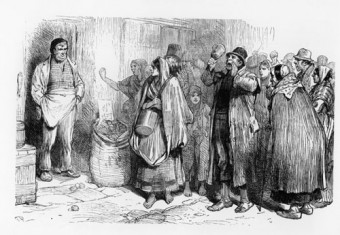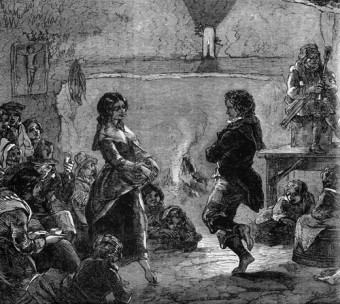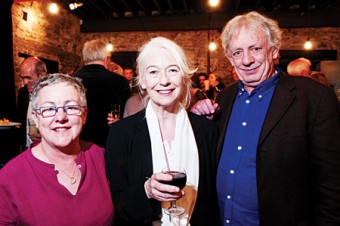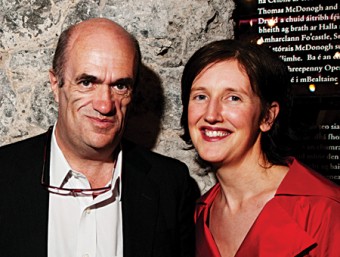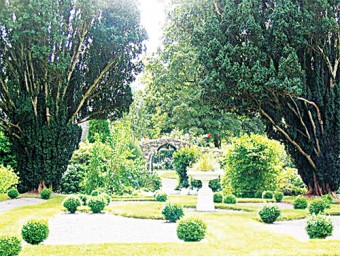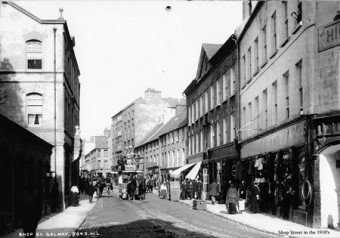The crucial match that Loughrea lost
Thu, Nov 05, 2009
One of the many voices in our kitchen when I was growing up was Michael O’Hehir and the Sunday afternoon game. The GAA (Chumann Lúthchleas Gael) has been blessed with its RTE broadcasters. I don’t think anyone can equal the inimitable Míchéal Ó Muircheartaigh, whose all inclusive broadcasts today are a performance in themselves. I think I am the same as most people to say that I turn down the sound on the TV, and turn up the volume on the radio when Ó Muircheartaigh takes flight.
Read more ...The Strange case of Warden Bodkin’s hand...
Thu, Oct 29, 2009
Week II
What did John Bodkin, the last Catholic warden of St Nicholas Collegiate Church, mean when, handing over the keys of the church to the Williamite soldiers in July 1691, he cried: “My God, that my right hand may not decay until the key of this church be restored to its proper owners?”
The strange case of Warden Bodkin’s hand...
Thu, Oct 22, 2009
In March 1838, workmen, under the supervision of a Mr Clare, were carrying out repairs on the vaults and tombs near the main altar of St Nicholas’ Collegiate Church. They made a remarkable discovery. A body, which had rested in a tomb for 129 years, had been discovered incorrupt. Incredibly it was the remains of the last Roman Catholic warden John Bodkin, who when handing over the keys of the church to Williamite soldiers, after the town’s surrender on July 26 1691, cried out in despair: “ My God, that my right hand may not decay until the key of this church be restored to its proper owners”.
Read more ...Portrait of the writer as a young man
Thu, Oct 15, 2009
The great Welsh poet Dylan Thomas (Oct 27 1914 - Nov 9 1953) had absolutely no interest in school. He attended Swansea Grammar where his father, DJ Thomas, was the much feared English teacher. Both the boys and the staff were afraid of his temper, so much so that when Dylan, frequently bored with school, walked out murmuring that he was gong to write ‘bloody poetry’, if he met the headmaster on his way, the head would only nod, and say; “Don’t get caught, will you?”
In was amused to see that when the Galway writer Walter Macken was at the ‘Bish’ and asked to be excused from class for the toilet, Bro Leonard, who had a sense of humour and knew most of the boys hopped out for a ‘quick smoke’, would say: ‘Do you want a match Macs?’
Read more ...A risen people achieve their own miracle
Thu, Aug 27, 2009
An unusual feature of the apparition at Knock on August 21 1879, was that it was silent. On all other occasions when the Virgin Mary has appeared, a verbal message was imparted to the visionaries. It was usually an exhortation to pray. But the Knock vision, consisting of Mary, St Joseph, St John the Evangelist, and other religious images, was motionless. There was no verbal message.
Read more ...In the summer of 1879, the role of the Church in the Land Movement was centre stage...
Thu, Aug 20, 2009
Week II
The fledging Land League, officially founded in Castlebar October 21 1879, had every reason to believe that the influential Archbishop of Tuam, John MacHale, the great supporter of Daniel O’Connell and Fenianism, would support them.
The fledging Land League, officially founded in Castlebar October 21 1879, had every reason to believe that the influential Archbishop of Tuam, John MacHale, the great supporter of Daniel O’Connell and Fenianism, would support them.
Read more ...Miracle at Knock, and a disturbed County Mayo...
Thu, Aug 13, 2009
If any reader thought that spirituality was a dying aspiration of the Irish people, they might recall the 20,000 or so who climbed Croagh Patrick on the last Sunday of July, or go to Knock, Co Mayo, on August 15, the Feast of the Blessed Virgin Assumed into Heaven, to see thousands of people, many in family groups, happily attending Mass, saying the Stations of the Cross, eating ice-cream and chips, thoroughly enjoying the day out.
Read more ...200 years ago the Belles of Galway spent their time ‘buying, laughing and chatting’
Thu, Aug 06, 2009
Week II
Gala night for Druid: Magnificent Gigli Concert in new theatre
Thu, Jul 23, 2009
It is exactly 30 years since Thos McDonogh and Sons presented Druid Theatre, for a peppercorn rent, with an old warehouse in Chapel Lane, in Galway’s Latin Quarter. It was far from a Latin Quarter at the time. Like other parts of the old city most of it was falling apart. Old 18th and 19th century buildings were roofless and derelict, a home for cats and rats. But it had a rough diamond look about it too with its pawnbrokers, ‘Nora Crubs’, the always warm Tigh Neachtain’s (if you could get in!), the Pedler and Kenny bookshops, Sonny Molloy’s very modest women’s undergarments shop, and the larger than life Mrs Mc Donagh, who showed us all that there was more to the fish industry than a stinky grilled herring, fried mackerel, and the auld cod.
Read more ...Colm Tóibín’s praise: Druid’s new light on the world
Thu, Jul 23, 2009
Speaking at the official opening of the new Druid Theatre last Friday evening, the award winning writer Colm Tóibín firmly placed this Galway theatre at the centre of “ the very life of the country itself, in its shifting sense of itself, in its very reality”...
Read more ...Gardens and history roll into one at Woodville
Thu, Jul 02, 2009
Once off the duel-motorway at Athlone, the traffic on our main roads is often so heavy that if I have time, I will take a country road home. Loughrea’s welcome new by-pass makes a visit to that old busy town now worthwhile, and easy. Its difficult to pass St Brendan’s Cathedral, and its magnificent Celtic stained glass windows and sculpture, without a visit. And then, take the Gort road to Galway. On a glorious summer afternoon, the hedgerows are bursting with white blackberry blossom, wild irises, fuchsia, honeysuckle and foxglove. I was looking for Woodville House and its newly opened walled garden, but ruined cut-stone walls, and high gates reminded me that here, in this corner of Galway, poor tenant farmers stood up to the powerful Marquis of Clanricarde to own the land they worked on. The so-called Land War was fought nowhere more fierce, nor attracted more world wide publicity than on the Clanricarde estates in Portumna, Woodford, Eyrecourt and surrounding areas.
Not all landlords were bad, but Clanricarde was the archetypical landlord scoundrel. He was described as having a miserly personality, eccentric and reclusive, with a fundamental inability to compromise or adapt to changing circumstances in Irish society at the time. He lived in London. It was said that he only once visited his Portumna castle, and that was for his father’s funeral in 1874. Even for the time his estates were vast. They stretched from Lough Derg to Galway. He was ruthless in dealing with any tenant who couldn’t pay his rent. There is a famous letter he wrote on January 29 1881 in reply to the argument by his land agent John Blake* that some tenants were simply too poor to pay. Clanricarde refused to allow any leniency. He pointed out, that: ‘Unless husbandmen can afford to plant something better than stones (or bad potatoes which are as useless as stones) they are not fit to be tenant farmers.’
Read more ...Ross Castle - A labour of love
Thu, Jun 25, 2009
I have always had great respect for the Irish yew tree. Because of its association with sanctuary and protection in mythology, you often see the yew in old graveyards. But its strength and bulk in old age, (it can live for hundreds of years, fertile to the last bearing red berries and new growth every spring), it is also associated with love and protection. It is considered a great gift to have yew in your garden. If you are fortunate to have yew trees of a great age you are doubly blessed. Its branches are traditionally used in the Palm Sunday ritual.
Read more ...The reason why the Baroque Singers are the best in Ireland
Thu, Jun 18, 2009
There can only be two reasons why music highbrows are still a bit ‘iffy’ about the Welsh composer Karl Jenkins. One is probably a comment on his unusual route into classical music. A talented music scholar from Cardiff University and the Royal Academy London, he founded a jazz group Nucleus, which won first prize in the Montreux Jazz Festival. Then to keep bread on the table, he made a series of TV advertising jingles. One of them, called ‘got off the ground’, was for an airline. But it became so popular and catchy, that people were clogging the airline’s phones demanding what was that amazing music. Jenkins developed the theme and, extending its African and Arabic sounds, it became the energetic Adiemus. It topped the pop charts across the world.
Read more ...Old Reynard read The Tribune
Thu, Jun 11, 2009
The Easter Rising on Monday April 24 1916, not only took the British authorities by surprise but also the general population of Ireland. In many places, including the town of Galway, the news that fighting had broken out in Dublin was greeted with amazement, and disbelief. Remember World War I was raging at the time. The Battle of Verdun, which was to continue until December with horrendous casualties, was at a critical stage. Its progress was extensively covered in all newspapers. Furthermore, as a result of an intensive recruiting campaign in both the town and county, there was barely a home in Galway that was not affected by the war. Young men in their thousands joined the British armed forces to defend their homeland, to protect the women of Belgium, for a sense of adventure and a decent wage; and in the words of the Irish Parliamentary Party, ‘ to win freedom for Ireland’.
Read more ...China has its own Andrew Lloyd Webber (Week II)
Thu, May 07, 2009
A geological phenomenon in southwest China is more than 400 kilometres of towering limestone rocks covered in vegetation. It’s a spectacular landscape. Thousands of these hills soar into the sky, weathered and carved by the wind and rain, often taking on the shape of a man fishing, an elephant drinking water, or a woman feeding her baby, or eager friendly creatures looking down at you (the Chinese are wonderful for encouraging you to look at natural shapes in caves and mountains and say; ‘use your imagination, what do you see?’). These cone-shaped wonders become in effect a ‘forest of hills’, and their beauty is doubled as they are reflected in the River Li, which winds though them like a blue silk ribbon.
Read more ...Galway was ready to serve...
Thu, Mar 26, 2009
On the evening that France and Britain declared war on Germany, September 3 1939, the 13,500-ton liner SS Athenia, chartered by the Cunard Line, and bound for Montreal with 1,418 passengers and crew was torpedoed, without warning, 250 miles northwest of Malin Head in the North Atlantic*. The following day the Norwegian vessel, Knute Nelson, was steaming towards Galway with 367 shocked and injured survivors, and asked that the city be prepared to receive them. Other survivors were picked up by British naval vessels and brought elsewhere for treatment, but in total 112 passengers and crew were killed in the attack, 28 of them Americans sailing for home as war was declared in Europe.
Read more ...St Patrick passed us by, but some magic remains...
Thu, Mar 19, 2009
Another St Patrick’s Day has slipped by, and I am reminded that although there are several wells associated with saints in and around Galway city, St Patrick, on his many journeys around Ireland, notably in Mayo, passed Galway by.
The principal Galway Patrician site is Maam Éan, the only pass through the Maumturk Mountains which stretch from Killary Bay to a north-west inlet of Lough Corrib. Without this pass (a pleasant walk signposted from the main Galway/Clifden road, or from the other side of the mountains, signposted on the Maam Bridge/Leenane road), it was a long way round for drovers and shepherds, travellers and pilgrims.
Read more ...Two faces lean out of the window...
Thu, Mar 12, 2009
Before the disbandment of the Connaught Rangers in 1922, it was customary on Sunday mornings for the Protestant members of this proud regiment to march in full uniform, with bagpipes and drums, out of Renmore barracks, through the town to attend service at St Nicholas Collegiate Church. It was an exciting spectacle for many of the girls of Galway. They would gather in small groups, or lean from windows, to catch the eye of a handsome soldier. Monsignor Considine would often precede the parade waving at the girls to go away. Pointing up to the girls at the windows (many of them apprentices, who lived above the shops whose trade they were learning), telling them ‘Not to be looking at those Protestant soldiers’. Most girls would quickly hide, and once the monsignor had passed, pop their heads out again.
Read more ...De Valera’s Galway speech angers Nazi Germany
Thu, Mar 05, 2009
Eamon de Valera was in Galway on the evening of May 11 1940 engaged in a by-election campaign, when he was told that Germany had invaded Belgium and Holland that morning. He was outraged. Belgium felt that by declaring its neutrality it was protected from Hitler. But it was sadly mistaken. Germany felt threatened (at least it pretended to be), that the Allies may use Belgium as a ‘jumping off’ base to attack her. With terrifying speed and ruthlessness, using new tactics of fighter bombers and tanks, Germany subdued both countries in a matter of days.
Dev must have wondered at the fragility of any country hoping to escape the war by stating its neutrality. Would the same fate await Éire? And he must have been thinking too of his work in Geneva as president of the Council of the League of Nations, seven years earlier. The small nations of Europe were friendly to each other, and supported each other’s needs. Two of whom were now on the verge of disappearing.
Read more ...